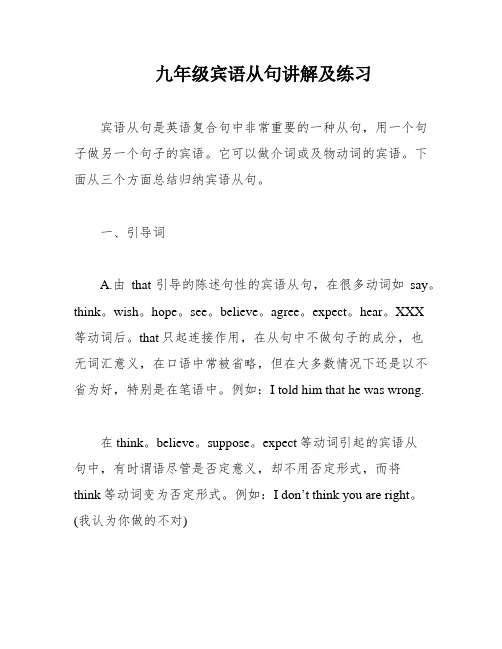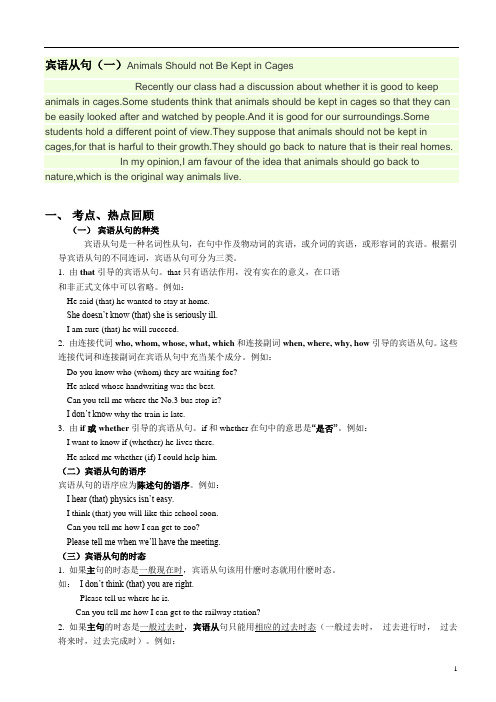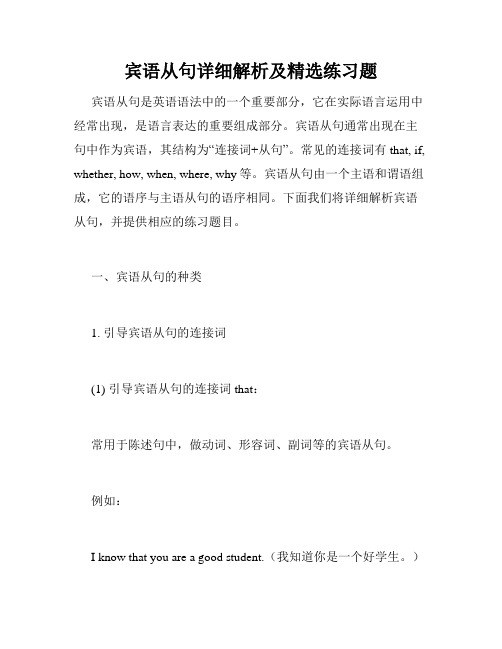宾语从句解释及例句练习
九年级宾语从句讲解及练习

九年级宾语从句讲解及练习宾语从句是英语复合句中非常重要的一种从句,用一个句子做另一个句子的宾语。
它可以做介词或及物动词的宾语。
下面从三个方面总结归纳宾语从句。
一、引导词A.由that引导的陈述句性的宾语从句,在很多动词如say。
think。
wish。
hope。
see。
believe。
agree。
expect。
hear。
XXX等动词后。
that只起连接作用,在从句中不做句子的成分,也无词汇意义,在口语中常被省略,但在大多数情况下还是以不省为好,特别是在笔语中。
例如:I told him that he was wrong.在think。
believe。
suppose。
expect等动词引起的宾语从句中,有时谓语尽管是否定意义,却不用否定形式,而将think等动词变为否定形式。
例如:I don’t think you are right。
(我认为你做的不对)在许多带有复合宾语的句子中,that引导的宾语从句经常移到句子的后面,而用it做形式宾语。
例如:We think it wrong that he told a lie to XXX(我认为他向每一个人撒谎是错误的)B.由连词if、whether引导的表示“是否…”的宾语从句。
XXX和if可以替换。
例如:I don’t know if/whether he will come tomorrow。
The teacher asked if/whether we had finished XXX.注意:1.在介词后面的宾语从句中不用if引导。
例如:Everything depends on whether we have XXX.2.宾语从句中有or not时不用if引导。
例如:I don’t know whether the movie star will come or not.3.和不定式连用作宾语时不用if引导。
例如:Whether to go there or not hasn’t been decided.C.由wh-引导的宾语从句。
初三英语宾语从句讲解、练习与答案

宾语从句(一)Animals Should not Be Kept in CagesRecently our class had a discussion about whether it is good to keep animals in cages.Some students think that animals should be kept in cages so that they can be easily looked after and watched by people.And it is good for our surroundings.Some students hold a different point of view.They suppose that animals should not be kept in cages,for that is harful to their growth.They should go back to nature that is their real homes.In my opinion,I am favour of the idea that animals should go back to nature,which is the original way animals live.一、考点、热点回顾(一)宾语从句的种类宾语从句是一种名词性从句,在句中作及物动词的宾语,或介词的宾语,或形容词的宾语。
根据引导宾语从句的不同连词,宾语从句可分为三类。
1. 由that引导的宾语从句。
that只有语法作用,没有实在的意义,在口语和非正式文体中可以省略。
例如:He said (that) he wanted to stay at home.She doesn’t know (that) she is seriously ill.I am sure (that) he will succeed.2. 由连接代词who, whom, whose, what, which和连接副词when, where, why, how引导的宾语从句。
初中宾语从句专项讲解以及练习题(附答案及解析)

宾语从句知识全解1. 宾语从句的理解常见的宾语有两种情况,一是名词或代词,二是介词+名词或代词(介宾)如:I miss you/my friend (其中you/my friend 就是代词/名词)He is looking at me/my face (其中at me/my face 介词+名词或代词) 结论:一般情况下,宾语都是一个词/介词+一个词 在观察以下句子 I don ’t know you (原来是一个词当宾语)I don ’t know if you are right (现在是一个句子)结论:将宾语变为一句话的句子就是宾语从句2. 宾语从句的判断思考:英语句子有很多!怎么判断哪些是宾语从句呢?技巧:常见的宾语从句情况有两种结论:记住两种情况一是动词+句子,二是介词+句子,两种即为宾语从句3. 宾语从句的引导词的理解思考:宾语从句为什么需要引导词?不用引导词不是更加简单?语言的作用是用简洁清晰表达想表达的,为什么要加引导词增加复杂程度?我们对比以下两个句子,找一下答案:I don ’t know he is a student.(先不考虑可以省略的情况)(对于一个句子只有一个动词的原则,这里出现了两个动词,一个句子不可能出现两个动词,而又没有连接词,容易让读者产生误会,认为这句话有语法错误。
)I don ’t know that he is a student.(整个句子虽然有两个动词,但是因为第二个句子开头有一个引导词“that ”(其作用相当于连接词)连接,符合一个句子一个动词原则即,句子+连接词+句子)结论:引导词有代替连接词的作用,可以帮助读者理解句子的结构动词+句子I don ’t know if you are right. 介词+句子 We are talking about if it will rain tomorrow. 宾语从句1.判断以下句子哪个是宾语从句()A.Teacher told that the sun is bigger than the moon to us.B.I have hated him since I was five.C. The children go to school by car every day.D.I met the man who is my friend’s uncle yesterday at school.解析:根据一是动词+句子,二是介词+句子的两种情况,只有A选项符合以上的情况。
初中英语 宾语从句

5. 宾语从句的简化 ①当主句谓语动词是find,see,watch,hear等感官动词时, 从句常简化为“宾语+宾补”结构,宾补为不带to的不定式或 V-ing形式。如:
She found that the wallet was lying on the ground.
→She found the wallet lying on the ground. ②. 当主句谓语动词是hope,wish,decide,forget,plan, agree等,且主句主语与从句主语相同时,从句可简化为不定 式结构。如:
now. ②.当宾语和宾语补足语是被动的关系时,宾 语补足语用过去分词形式。 如.:You'd better have the desk cleaned.你最好请人把课桌擦一下。
3.由名词充当。 某些动词call, name, make, think, find, consider, 后接名词或代词作其语,再接名词 作宾语补足语,补充说明宾语的身份。 如: I called this cat Mimi. 我把这只猫叫做咪咪。 4.由形容词充当。 某些动词如make,keep,find, like,等后接名词或代词作宾语,再接形容词作宾语 补足语,补充说明宾语的状态、特征等。 You must keep the classroom clean.你应保持 教室清洁。
meeting the next week.
③. 由连接代词who, whom, whose, what, which和连接副词when, where, why, how 引导的宾语从句。这些连接代词和连接副词 在宾语从句中充当某个成分,不可以省略。 如: Do you know who(whom)they are waiting for now? He asked whose handwriting was the best in their class. Can you tell me where the No.3 bus stop is? I didn't know why the train was late again.
初中语法:宾语从句知识点讲解及练习(含答案)

初中宾语从句一、定义宾语从句是英语复合句中非常重要的从句之一,也是初中阶段要求重点掌握的从句。
宾语从句属于名词性从句,是用一个句子做另一个句子的宾语。
宾语从句一般做介词或及物动词的宾语,如:We all expect that they will win.我们所有人都盼着他们能赢。
(动宾)We are talking about whether we should keep the money.我们正在讨论是否应该收下这笔钱。
(介宾)二、宾语从句的连接词宾语从句的引导词很多样,基本涵盖了从句中涉及的所有引导词,可分为从属连词,连1. 若主句是现在时的某种时态(一般现在时,现在进行时,现在完成时),宾语从句不受限制,可以根据实际情况随意穿越,如:I remember he gave me a book yesterday.我记得他昨天给了我一本书。
He has told me that he will leave for Shanghai next week.他已经告诉我下周他就要动身去上海了。
2. 若主句是过去时的某种时态(包括一般过去时,过去进行时),那么宾语从句一般要用过去的某种时态(包括一般过去时,过去进行时,过去将来时,过去完成时),如:I only knew he was studying in a western country.我只知道他当时在西方的一个国家读书。
My teacher told me that Mrs. Rosemary had been back to Australia already.我的老师告诉我,Rosemary夫人已经回澳大利亚了。
He told me that he would take part in the high jump.他告诉我他将会参加跳高。
3. 若从句是一个客观真理,那么从句用一般现在时,不根据主句的时态而变化,如:He told me that the earth goes around the sun.(真理)他告诉我地球围着太阳转。
什么是句子宾语从句例句

什么是句子宾语从句例句什么是句子宾语从句例句在语文学习中,宾语从句是重要的语法知识点。
宾语从句是指在一个完整的句子中,起宾语作用的句子,它通常由一个连词引导,例如:that, whether, if, who, whom, whose, which, what等等。
那么宾语从句在句中的作用是什么呢?接下来我们来具体解析一下。
宾语从句可以作为一个复杂句子的主体,因为它起到了一个完整句子的作用。
作为句子成分,宾语从句通常放置在主句的谓语动词之后。
同时,宾语从句也有三种类型,分别是陈述语气、疑问语气和祈使语气。
下面将分别举例说明不同语气的宾语从句:陈述语气:陈述语气的宾语从句是最常见的一种。
它表达的是一个肯定的事实或真相,引导词通常为that。
例如:1. I believe that he is honest.(我相信他是诚实的。
)2. She hopes that he will come to her party.(她希望他能来参加她的派对。
)3. We noticed that he was absent yesterday.(我们注意到他昨天缺席。
)疑问语气:疑问语气的宾语从句通常用于询问事实或真相。
引导词可以是whether或if,取决于问句的形式。
例如:1. Do you know whether he is coming?(你知道他是否来吗?)2. He is not sure if he wants to go on vacation this year.(他不确定他是否想在今年度假。
)3. Could you tell me if the meeting has been postponed?(你能告诉我会议是否已经延期了吗?)祈使语气:祈使语气的宾语从句通常表达一种命令、建议或请求。
引导词通常为that。
例如:1. She suggested that he leave early in the morning.(她建议他早上早点离开。
宾语从句讲解及练习附答案

一.宾语从句的定义置于动词、介词等词性后面起宾语作用的从句叫宾语从句。
谓语动词、介词、动词不定式,v.-ing形式后面都能带宾语从句。
有些形容词(afraid,sure,glad等)之后也可以带宾语从句。
二.宾语从句中引导词的用法在复合句中作主句的宾语,引导词有:连词:that (that 常可省略),whether, if代词:who, whose, what ,which副词:when ,where, how, why 等。
(一)that引导的宾语从句(在非正式场合that可以省略)1. 可跟that从句做宾语的动词有:say, think, insist, wish, hope, demand, imagine, wonder, know, suppose, see, believe, agree, admit, deny, expect, explain, order, command, feel, dream, suggest, hear, mean, notice, prefer, request, require, propose, declare, report 等。
例句:The boy believes that he will travel through space to other planets.2.引导宾语从句的that在下列情况下一般不省略:(1). 宾语从句前有插入语。
如:We hope, on the contrary, that he will stay at home with us. 恰恰相反,我们希望他和我们呆在家里。
(2). 有间接宾语时。
如:He told me that he was leaving for Japan. 他告诉我他要去日本。
(3). that在与之并列的另一个宾语从句之后。
如:He said (that) the book was very interesting and that(不省略) all the childrenlike to read it.他说那本书很有趣,所有小孩都喜欢读。
宾语从句详细解析及精选练习题

宾语从句详细解析及精选练习题宾语从句是英语语法中的一个重要部分,它在实际语言运用中经常出现,是语言表达的重要组成部分。
宾语从句通常出现在主句中作为宾语,其结构为“连接词+从句”。
常见的连接词有that, if, whether, how, when, where, why等。
宾语从句由一个主语和谓语组成,它的语序与主语从句的语序相同。
下面我们将详细解析宾语从句,并提供相应的练习题目。
一、宾语从句的种类1. 引导宾语从句的连接词(1) 引导宾语从句的连接词that:常用于陈述句中,做动词、形容词、副词等的宾语从句。
例如:I know that you are a good student.(我知道你是一个好学生。
)He said that he would come tomorrow.(他说他明天要来。
)(2) 引导宾语从句的连接词if / whether:用于是否疑问句中。
例如:I don't know if / whether he will come to the party.(我不知道他是否会来参加派对。
)We asked if / whether we could go to the beach.(我们问能否去海滩。
)(3) 引导宾语从句的连接词how:用于问方式的疑问句中。
例如:I don't know how to do this.(我不知道怎么做。
)Can you tell me how to get to the station?(你能告诉我去车站怎么走吗?)(4) 引导宾语从句的连接词when / where / why:分别用于问时间、地点和原因的疑问句中。
例如:I don't remember when we met.(我不记得我们是什么时候见的面。
)Do you know where he lives?(你知道他住在哪里吗?)I don't know why he didn't come.(我不知道他为什么没来。
- 1、下载文档前请自行甄别文档内容的完整性,平台不提供额外的编辑、内容补充、找答案等附加服务。
- 2、"仅部分预览"的文档,不可在线预览部分如存在完整性等问题,可反馈申请退款(可完整预览的文档不适用该条件!)。
- 3、如文档侵犯您的权益,请联系客服反馈,我们会尽快为您处理(人工客服工作时间:9:00-18:30)。
一个句子如果加上宾语从句,句子显然变复杂了,也变的difficult了,其实,你大可不必发愁。
只要掌握好宾语从句的用法,一切问题就迎刃而解了。
宾语从句由关系代词或关系副词引出。
我们根据引导宾语从句的连词不同,可把宾语从句分为三类。
以that引导的宾语从句。
如:I hear that you have passed the examination. Good luck!以if 和whether引导的宾语从句。
如:I don't know if you can come tomorrow.以连接代词或连接副词引导的宾语从句。
如:Please tell me how you can get here.运用宾语从句要注意以下几点:宾语从句的语序一定是陈述句语序。
主句的谓语动词的时态如果是过去时态,宾语从句谓语动词的时态要选用相应的过去某一种形式。
如果宾语从句表示的是客观真理,事实时,即使主句是过去式,从句仍用一般现在时。
一、宾语从句的引导词宾语从句通常由连词that和whether (if)、连接代词或连接副词以及关系代词型what引导:1. that引导We believe that he is honest. 我们相信他是诚实的。
The doctor insists that I give up smoking医生坚持要我戒烟。
I suggest that we should go tomorrow. 我建议我们明天走。
I suggested that we should go the next day. 我建议我们第二天走。
We learnt from his letter that he was in Spain. 从他的信里我们了解到他在西班牙。
The seller demanded that payment should be made within five days. 卖方要求5日内付款。
2. whether / if引导I don’t know whether he’ll arrive in time. 我不知道他是否能及时到。
I didn’t know whether they liked the place. 我不知道他们是否喜欢这个地方。
I’ll see whether I can induce him to accept it. 我要看看我是否能劝他接受。
I asked her whether she agreed. 我问她是否同意。
He enquired if her parents spoke Spanish. 他问她父母是否讲西班牙语。
I wonder if it’s large enough. 我不知道它是否够大。
She didn’t say if he was still alive. 她没说他是否还活着。
3. 连接代词引导I don’t know who [whom] you mean. 我不知道你指谁。
Please tell me which you like. 告诉我你喜欢哪一个。
I’Il do whatever I can do. 我将做我所能做的事。
You can take whichever you like. 你爱拿哪个就拿哪个吧。
We’ll do whatever we can to save him. 我们将尽我们所能来挽救他。
Take whichever seat you like. 你要坐哪个座就坐哪个座位。
Give it to whoever you like. 你把它爱给谁就给谁。
You don’t know what you are talking about. 你在说什么,你自己也不知道。
Tomorrow at this time we’ll know who is elected. 明天这时候我们就会知道谁当选了。
4. 连接副词引导He asked why he had to go alone. 他问他为什么必须一个人去。
You don’t know when you are lucky. 你身在福中不知福。
I asked how he was getting on. 我问他情况怎样。
He knows where they live. 他知道他们住哪里。
Have you found out how wide the ditch Was? 你了解到那条沟有多宽吗?I’d like to know when they will let him out. 我很想知道他们什么时候会放他出来。
We didn’t know why he had answered in that fashion. 我们不明白他为什么这样回答。
3. 关系代词what引导She has got what she wanted. 她要的东西得到了。
I want to tell you what I hear. 我想把听到的情况告诉你。
He could not express what he felt. 他无法表达内心的感受。
They did what they could to console her. 他们尽量安慰她。
They thought they could do what they liked with him. 他们以为他们可以对他为所欲为。
【注意】有时介词后可接一个宾语从句(但介词后通常不接that和if引导的宾语从句):From what you say, he is right. 根据你所说的,他是对的。
有极个别介词(如but, except)可接that引导的宾语从句:She remembered nothing about him except that his hair was black. 她对他什么都不记得,只记得他的头发是黑的。
比较下面两句用what引导的宾语从句,它们的意思不一样:He began to think about what he should do. 他开始考虑应当怎样做。
二、宾语从句与形式宾语it当宾语从句后跟有宾语补足语时,通常在宾语从句处使用形式宾语it,而将真正的宾语从句移至句末:I think it best that you should stay here. 我认为你最好住这儿。
He hasn’t made it known when he is going to get married. 他还没宣布他何时结婚。
She found it difficult to answer the question. 她发现回答这个问题很困难。
He feels it his duty to hetp others. 他认为帮助别人是他的责任。
He thought it best to be on his guard. 他认为他最好还是要警惕。
He made it a rule to speak in Parliament at least once every session. 他规定自己在议会每次开会时至少发一次言。
I find it interesting talking go you. 我觉得同你谈话很有意思。
I consider it wrong to cheat in an examination. 我认为考试作弊是不对的。
三、连词that的省略问题引导宾语从句的连词that 通常可以省略:She said (that) she would come to the meeting. 她说过要来开会的。
I promise you (that) I will be there. 我答应你我会去。
I hoped (that) I would / should succeed. 我曾希望我会成功。
He thinks (that) they will give him a visa. 他想他们会给他签证。
He thought (that) they would give him 3 visa. 他本想他们会给他签证。
I expect (that) the plane will he diverted. 我料想飞机会改变航线。
I expected (that) the plane would be diverted. 我本料想飞机会改变航线。
Everybody knows (that) money doesn’t grow on trees. 众所周知,金钱是不会从树上长出来的。
I sugges ted (that) they should / shouldn’t drive along the coast. 我建议他们沿着/ 不要沿着海岸开车。
【注】有时为了强调,that引导的宾语从句可位于句首,此时that不可省略:That she is a good girl I know. 她是一个好姑娘,我是知道的。
四、宾语从句与否定转移当动词think, believe, suppose, expect, imagine 后接一个表示否定意义的宾语从句时,其否定通常转移到主语:I don’t suppose that it is true. 我认为那不是真的。
I don’t imagine that he will come. 我想他不会来的。
I don’t think we need waste much time on it. 我想我们不必在这上面花太多时间We didn’t think we’d be this late. 我们没想到我们会到得这么晚。
I don’t suppose I’ll trouble you again. 我想我不要再麻烦你了。
练习:1. She asked me if I knew _______.A. whose pen is itB. whose pen it wasC. whose pen it isD. whose pen was it2. I don't know _______ he still lives here after so many years.A. whetherB. whereC. whatD. when3. I don't know ______ he will come tomorrow. _______ he comes, I'll tell you.A. if, whetherB. whether, whetherC. if, ThatD. if, If4. The small children don't know ________.A. what is their stockings inB. where is in their stockingsC. where is their stocking inD. what in their stockings5. Can you tell me ________?A. when does the ship leaveB. when the ship will leaveC. when the ship leaveD. when will the ship leave。
